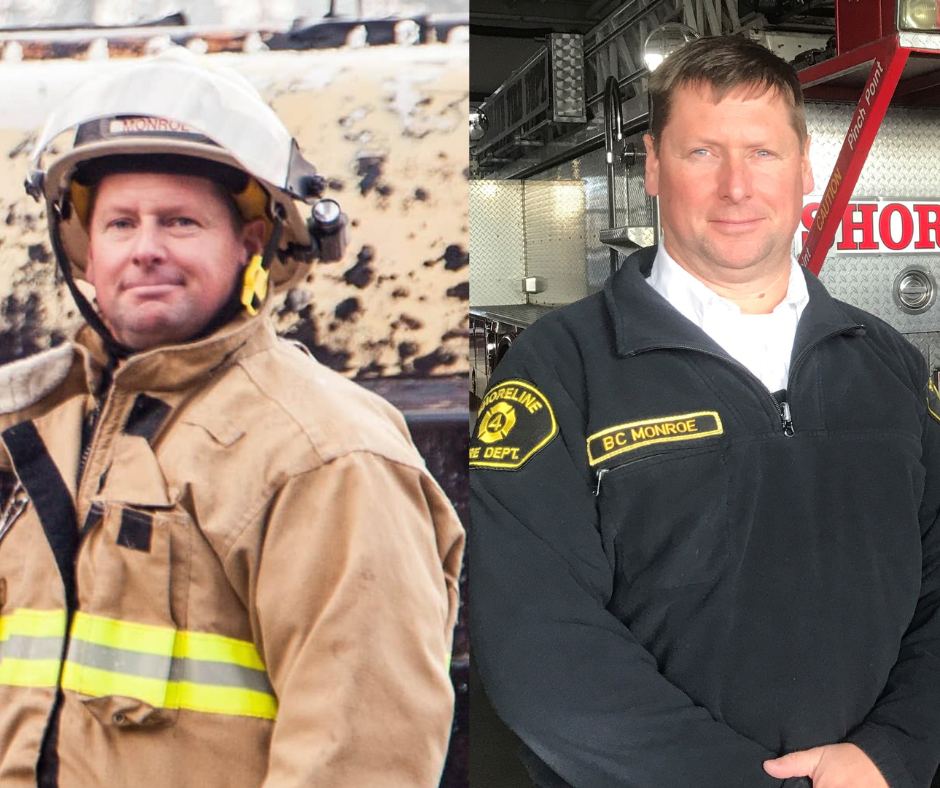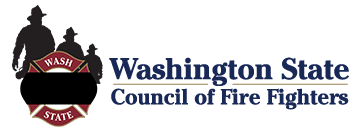
Your career exposes you to dangerous cancer-causing toxins. The Washington State Council of Fire Fighters (WSCFF) Cancer Foundation recognizes this risk and is here to support you.
Formerly known as the Firefighter Cancer Support Network – Washington Chapter (FCSN-WA), the WSCFF Cancer Foundation provides a comprehensive range of services, including fire fighter cancer education, model prevention policies and best practices, and direct support for fire fighters and their families facing a cancer diagnosis.
To learn more about the WSCFF Cancer Foundation’s work and impact, get to know the Foundation’s Director, Eric Monroe.
Eric, a retired Battalion Chief from the Shoreline Fire Department, L1760, has over 30 years of experience in the fire service. Before joining FCSN in 2011, co-founding the Washington State Chapter, Eric worked as a member of his local’s health and wellness team, promoting firefighter health and wellness issues including the development of an annual physical program and later the development of the department’s peer support team.
What sparked your passion for fire fighter health and wellness, especially cancer support?
Cancer awareness and prevention was not a part of the fire service in the ‘90’s and early 2000’s other than wearing your SCBA while fighting the fire to protect your lungs. After losing firefighters that I knew to cancer, I felt like the fire service needed to re-evaluate cancer prevention and get educated about the facts; then make the necessary changes to protect and support our membership.
You co-founded the Washington State Chapter of the Firefighter Cancer Support Network in 2011. What led you to take on that role?
As a member of our Department of Health and Wellness and E-Board member of Local 1760, I sent out a survey to all full-time departments in King, Pierce, and Snohomish Counties to determine which departments were offering annual physicals and whether they included screenings for cancers listed in the presumptive illness RCW. Bill Hoover was the only person who responded, as he too was seeking enhanced physicals for his department.
Bill and I discovered a shared interest in cancer prevention and support. We searched online and found the FCSN. We called to learn more about their program and ended up getting appointed as the FCSN representatives in Washington State.
Before we left the coffee shop that day, we made a list of goals for our program in Washington. Our desire to ensure that fire fighters knew of the higher risk of cancer due to occupational exposure led us to create the program in Washington State. Bill focused on specific projects, while I took on the role of director.
What motivates you with this work?
Seeing fire fighters take ownership of the cancer problem and create solutions that work. Being able to help someone navigate the challenges of a cancer diagnosis and letting them focus on themselves, rather than figuring out what to do, when to do it, and whom to talk to for more information.
Members should not have to figure out the questions to ask, where to find the answers, or how to manage treatment, work, and life all while dealing with the stress of a cancer diagnosis.
How has our understanding of cancer risks in the fire fighter profession evolved over your career?
I used to be ambivalent to cancer and was part of the generation of fire fighters that didn’t always wear SCBA’s on car fires, dumpster fires, smoldering mattresses or small kitchen fires. If we did wear them on-the-job, we took them off prior to performing overhaul – a dirty set of bunker gear and a smoke-stained helmet were a source of pride and accomplishment.
Reading the research and seeing the statistics – showing that nearly two-thirds to three-quarters of firefighter line-of-duty deaths in the past 20 years were due to cancer — motivates me to raise awareness and push for necessary changes.
What do you wish every fire fighter knew about cancer risk and prevention?
We have the opportunity to create solutions for ourselves as fire fighters, rather than waiting for legislative action from policymakers who may lack experience or expertise.
Gather the facts, believe the stats, and make changes that will increase the likelihood of healthy retirement.
Based on your experience, what’s your recommendation for fire fighters to monitor their health and reduce their cancer risk?
- Track your exposures, injuries, and illnesses in the Personal Injury-Illness-Exposure-Reporting System (PIIERS)
- Get annual physicals
- Follow the recommendations of researchers to reduce the number of exposures
- Look for new ways to be effective in doing your job while protecting yourself and protecting your crew
- Get educated about fire service cancers and stay current with updates
With the transition from FCSN to the WSCFF Cancer Foundation, what has changed?
For the end-user, nothing has changed. We continue to offer assistance through partnerships, meaningful resources, and referrals, drawing on nearly 15 years of experience.
We continue to look outside the box for opportunities to enhance our program, like our partnership with the National Firefighter Cancer Registry in PIIERS.
What types of support does the WSCFF Cancer Foundation offer fire fighters and their families?
The WSCFF Cancer Foundation:
- Navigates the challenges of a cancer diagnosis with you
- Provides meaningful resources and referrals for individuals to make educated decisions about their treatment and the potential impact on their future
Can you tell us about your WSCFF Cancer Foundation team, and your activities with the community?
The WSCFF Cancer Foundation Team is made up of fire fighters fire officers, and cancer survivors, all of whom have a deep passion and desire to change cancer incidences in the fire service. All team members have a deep passion for helping others and recognize the opportunities to support members with a cancer diagnosis.
We are active in promoting our program at fire service conferences, providing education at academies, and locally – when an organization requests our presentation.
How does the Foundation provide assistance to fire fighters and families experiencing cancer?
Navigating an illness, especially one that is work-related, can be complex and overwhelming. We support fire fighters and their families who are facing cancer by providing toolkits and resources to help them manage the challenges of a diagnosis. We offer guidance on managing treatment, balancing work and life, and accessing reliable information, enabling them to make informed decisions.
If a fire fighter or their family needs help, what’s the best way to reach out?
Request assistance through our website at www.wscffcancer.org. Submitted requests are immediately emailed to the leadership team to review and assign a team member to follow up with you.
We thank Eric, his team, and their ongoing efforts. We urge all of our members to sign-up for PIIERS and visit wscffcancer.org.
